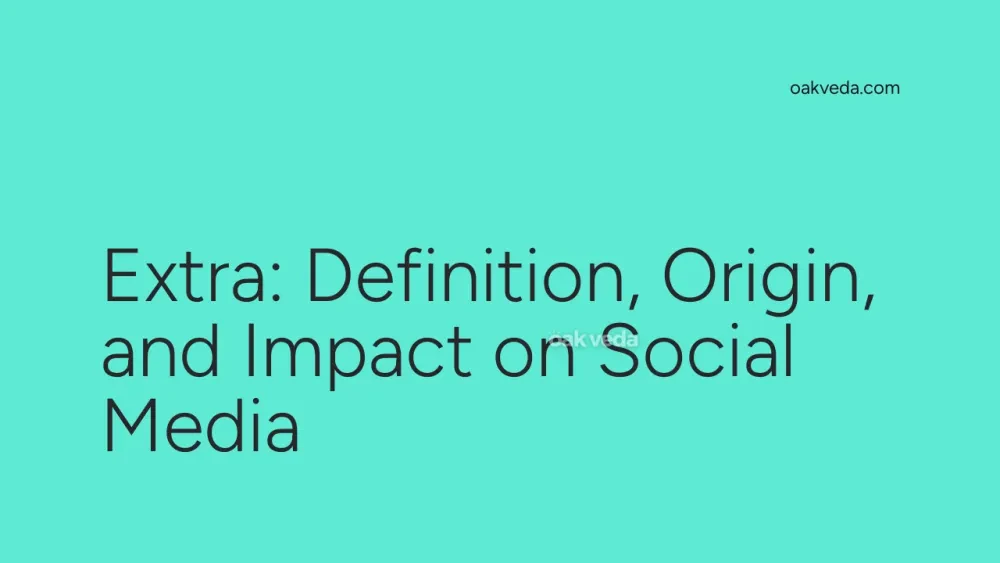
What is "Extra"?
In the realm of social media and pop culture, "Extra" has evolved into a powerful descriptor that goes beyond its traditional meaning. When someone or something is labeled as "Extra," it signifies behavior, appearance, or actions that are over-the-top, excessive, or dramatically flamboyant. This term has become a staple in online conversations, memes, and commentary on social platforms.
Origin and Development of "Extra"
The term "Extra" has its roots in African American Vernacular English (AAVE), where it has been used for several decades. However, its journey into mainstream culture and social media lexicon is a more recent phenomenon. As digital platforms became central to communication, "Extra" found its way into the broader online discourse, particularly among younger generations.
The evolution of "Extra" from AAVE to internet slang showcases how language adapts and spreads in the digital age. Its popularity surged as social media users embraced the term to describe attention-seeking behavior and exaggerated responses that are often prevalent online.
How "Extra" Works in Social Media Context
On social media, "Extra" functions as a versatile adjective to describe various situations:
- Personal Behavior: When someone overreacts to a minor situation or puts on an exaggerated performance for attention.
- Fashion Choices: Outfits or styles that are intentionally over-the-top or attention-grabbing.
- Content Creation: Videos, posts, or memes that go to extreme lengths for views or engagement.
- Event Planning: Parties or gatherings with elaborate, over-the-top decorations or themes.
The term is often used with a mix of amusement, admiration, and sometimes mild criticism, depending on the context.
Popular Examples of "Extra" on Social Media
- Celebrity Behavior: A celebrity wearing an outlandish outfit to a red carpet event might be described as "Extra."
- Viral Challenges: Social media challenges that require elaborate setups or extreme actions.
- Influencer Content: Over-the-top product reviews or lifestyle posts that go beyond normal expectations.
- Reaction Videos: Exaggerated reactions to news, trailers, or other content.
Impact of "Extra" on Social Media Culture
The concept of being "Extra" has significantly influenced social media culture in several ways:
- Content Creation: It encourages creators to push boundaries and create more engaging, albeit sometimes exaggerated, content.
- Self-Expression: Users feel more comfortable expressing themselves in bold, unconventional ways.
- Humor and Memes: "Extra" behavior often becomes the subject of memes and humorous content.
- Language Evolution: It demonstrates how internet slang can quickly become part of everyday language.
Controversies Surrounding "Extra"
While "Extra" is often used playfully, it's not without controversy:
- Cultural Appropriation: As with many terms originating from AAVE, there are concerns about its adoption by mainstream culture without proper credit.
- Encouragement of Extreme Behavior: Some argue that the glorification of "Extra" behavior on social media can lead to unhealthy attention-seeking.
- Authenticity Debates: Questions arise about the line between genuine self-expression and being "Extra" for likes and views.
How Brands and Influencers Use "Extra"
Savvy brands and influencers have embraced the concept of "Extra" in their marketing strategies:
- Bold Campaigns: Creating intentionally over-the-top advertisements or social media posts.
- Product Design: Developing products that are intentionally extravagant or unconventional.
- Influencer Partnerships: Collaborating with influencers known for their "Extra" persona or content.
- Event Marketing: Hosting elaborate, "Extra" events to generate buzz and social media coverage.
Future Trends Related to "Extra"
As social media continues to evolve, so too will the concept of "Extra":
- Augmented Reality (AR): AR filters and effects may provide new ways for users to be "Extra" in their content.
- Virtual Influencers: The rise of digital avatars may push the boundaries of what's considered "Extra" in the influencer space.
- Niche Communities: Specific platforms or communities may develop their own interpretations and applications of "Extra."
FAQs about "Extra"
-
Is being called "Extra" a compliment or an insult? It can be either, depending on the context and tone. Often, it's used playfully or with admiration for someone's boldness.
-
How has the meaning of "Extra" changed over time? From its origins in AAVE to its current use in social media, "Extra" has broadened in meaning while maintaining its core sense of excessiveness.
-
Can brands be "Extra"? Absolutely. Many brands intentionally adopt an "Extra" persona in their marketing to stand out and engage younger audiences.
-
Is there a difference between being "Extra" and being authentic? While being "Extra" can be a form of self-expression, it often involves intentional exaggeration, which may or may not align with one's authentic self.
-
How can I use "Extra" in my social media strategy? Consider creating content that's boldly creative, pushes boundaries, or plays with exaggeration, but always in a way that aligns with your brand voice and audience expectations.
In conclusion, "Extra" has become more than just a descriptor; it's a cultural phenomenon that reflects the evolving nature of self-expression and communication in the digital age. As social media continues to shape how we interact and present ourselves online, the concept of being "Extra" will likely continue to play a significant role in shaping content, trends, and online behavior.
You may be interested in:
- Altered My Brain Chemistry: Definition, Origin, and Impact
- Loop: Definition, Origin, and Impact on Social Media
- Natural Language Processing: Definition, Origin, and Impact
- Social Proof: Definition, Origin, and Impact on Digital Marketing
- Instagram Carousel: Definition, Origin, and Impact
- Coded: Definition, Origin, and Impact on Social Media

